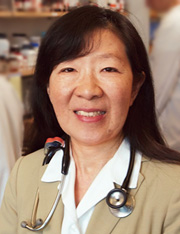Prominent Thai Medical Researcher and Her Team Makes Discovery On How Diabetes Causes Vascular Diseases
Source: Thailand Medical News Jul 21, 2019 6 years, 5 months, 1 day, 23 hours, 16 minutes ago
Endowed Professor of Cardiovascular Medicine from the University Of California-Davis, Dr Nipavan Chiamvimonvat who has a long litany of professional and international awards and more than 135 medical research papers published, has once again with her team made another major discovery as to the actual mechanism as to how diabetes causes vascular disease.
 Prof Dr Nipavan Chiamvomonvat
Prof Dr Nipavan Chiamvomonvat
Together with Professor Manuel Navedo, from the pharmacology department at US Davis, and their team of physicians and scientists, their study identified a cellular connection between diabetes and one of its major complications which is the narrowing of blood vessels that increases risks of several serious health conditions, including heart disease and stroke.
The research team had previously found that high blood glucose, the hallmark symptom of diabetes, activates an enzyme known as protein kinase A (PKA), which increases calcium channel activity and constricts blood vessels.This was unexpected as PKA is typically associated with blood vessel widening.
In order to understand what was causing the opposite effect, the team initiated a new study.They conducted a series of experiments on the effects of high glucose on cerebral blood vessels and arterial cells that control blood flow. The tests were conducted on a unique genetically modified animal model and two animal models of diabetes that were developed at UC Davis for studies of cardiovascular health.
The team focused on the correlation between PKA and adenylyl cyclase (AC), an enzyme involved in cyclic AMP (cAMP) production, a cellular messenger with a critical role in vascular cell function. Their findings showed that one AC in particular, AC5, mediated cAMP and PKA activation, triggering increased calcium channel activity and blood vessel narrowing. The researchers also found that AC5 was essential for blood-vessel constriction during diabetes.
The researchers now planning to test the effects of the AC5 chain reaction in high-glucose conditions in human cells. This step could confirm it as a treatment target for reducing the vascular complications of diabetes, which can include eye, kidney, cerebral, gastrointestinal and cardiovascular disease.
Professor Nipavan in an exclusive phone interview with Thailand Medical News commented "We see every day in our clinics the devastating impact of diabetes on the health and lives of our patients,our work brings into much clearer focus how high glucose can damage the vascular system and gives us a new target for blocking its effects."
The team hope their work leads to diabetes treatments, beyond blood sugar monitoring and insulin therapy, that target the molecular source of its damaging effects on the vascular system.
In addition to Professor Navedo and Professor Chiamvimonat, study authors (all of UC Davis Health) were Arsalan Syed, Gopireddy Reddy, Debapriya Ghosh, Maria Paz Prada, Matthew Nystoriak, Stefano Morotti, Eleonora Grandi, Padmini Sirish, Johannes Hell, Luis Santana, Yang Xiang and Madeline Nieves-Cintrón. The study was funded by the National Institutes of Health, American Heart Association, UC Davis School of Medicine and UC Davis Academic Federation.
